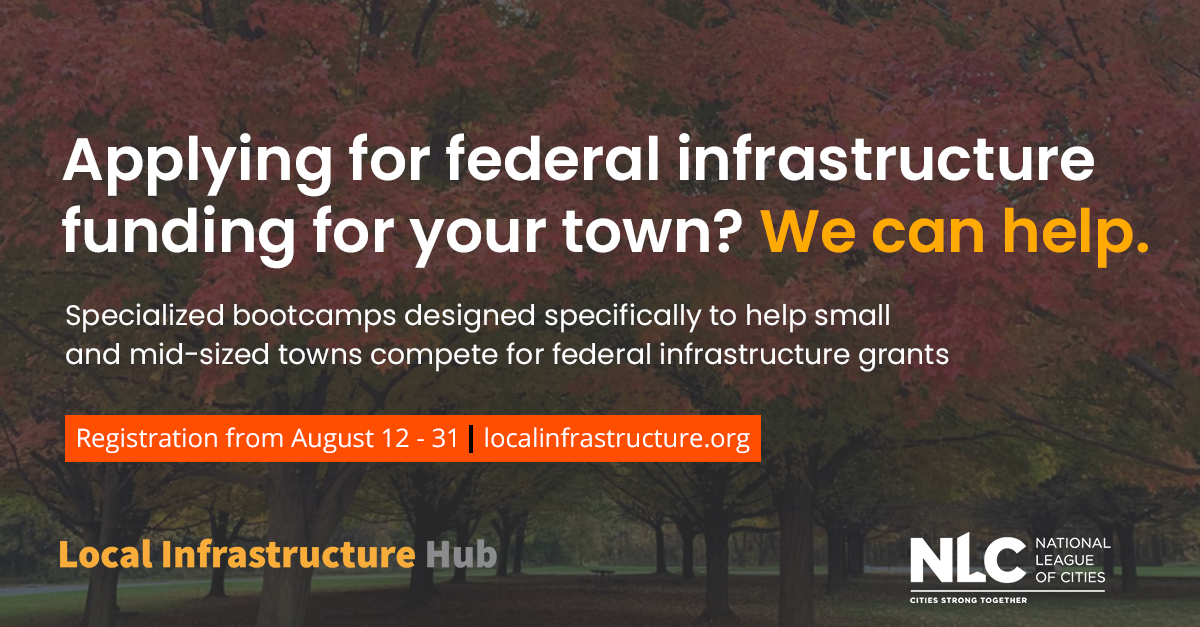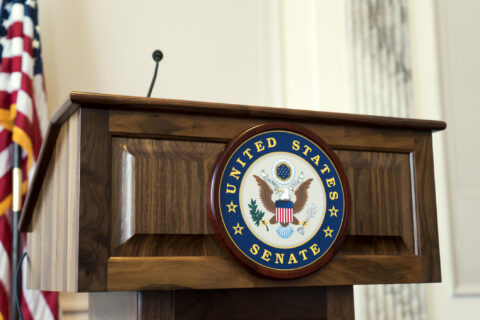For smaller cities and towns, submitting strong applications for competitive federal infrastructure money can be particularly challenging. Local teams are stretched thin and rarely have in-house grant-writing resources. Smaller cities often lack access to national networks, top technical expertise, and other supports from which larger cities regularly benefit. In fact, research conducted by the Local Infrastructure Hub revealed that dozens of small and mid-sized cities would decline to even apply for funding due to these challenges.
In acknowledgment of the challenges these cities and towns face, NLC and the Local Infrastructure Hub recently opened registration for small and mid-sized cities to participate in a new technical assistance program to help them access federal infrastructure funding. The specialized training courses will offer preparation to apply for some of the first grant opportunities available as part of the Bipartisan Infrastructure Investment and Jobs Act. An estimated 2,000 smaller communities will benefit over the next two years.

Bootcamp Offerings
With registration opening this month, the Local Infrastructure Hub is actively enrolling towns and cities with 150,000 residents or less in technical assistance trainings designed to help them prepare strong applications for upcoming federal grant programs authorized in the Bipartisan Infrastructure Law, which represent $4 billion in funding. In the months ahead, the Hub will provide support for additional federal grant opportunities. The first five upcoming opportunities include:
- Building Resilient Infrastructure and Communities ($1 billion): Supports communities as they undertake hazard mitigation projects, reducing the risks they face from disasters and natural hazards.
- These grants are intended to strengthen community resilience and reduce suffering from natural disasters such as wildfires, drought, hurricanes, earthquakes, extreme heat, and increased flooding.
- These grants are intended to strengthen community resilience and reduce suffering from natural disasters such as wildfires, drought, hurricanes, earthquakes, extreme heat, and increased flooding.
- Energy Efficiency and Conservation Block Grant Program ($550 million): Supports communities to implement strategies to reduce fossil fuel emissions, reduce the total energy use of the eligible entities, and improve energy efficiency in the transportation, building, and other appropriate sectors.
- Funding can be used for energy audits, retrofits, incentives to encourage energy efficiency improvements, and technical assistance to help develop conservation strategies.
- Funding can be used for energy audits, retrofits, incentives to encourage energy efficiency improvements, and technical assistance to help develop conservation strategies.
- Flood Mitigation Assistance Grants ($3.5 billion): Supports communities with projects that reduce or eliminate the risk of repetitive flood damage to buildings insured by the National Flood Insurance Program.
- Funding awarded can be used to support planning for individual or community flood mitigation projects, technical assistance for those projects, as well as implementation. Community projects might include drainage improvements, pump stations, topographic grading, seawalls, marsh restoration, and other nature-based solutions – whereas individual structure projects could include acquisition, relocation, elevation, and dry floodproofing of historic or commercial structures.
- Funding awarded can be used to support planning for individual or community flood mitigation projects, technical assistance for those projects, as well as implementation. Community projects might include drainage improvements, pump stations, topographic grading, seawalls, marsh restoration, and other nature-based solutions – whereas individual structure projects could include acquisition, relocation, elevation, and dry floodproofing of historic or commercial structures.
- Strengthening Mobility and Revolutionizing Transportation (SMART) Grant Program ($500 million): Supports communities on demonstration projects focused on advanced smart community technologies and systems to improve transportation efficiency and safety.
- These grants can be applied to projects incorporating coordinated automation, connected vehicles, sensors, delivery and logistics, innovative aviation, smart grid, and/or traffic signals.
- These grants can be applied to projects incorporating coordinated automation, connected vehicles, sensors, delivery and logistics, innovative aviation, smart grid, and/or traffic signals.
- Charging and Fueling Infrastructure Grants ($2.5 billion): Supports communities to address EV charging needs for passenger vehicles and light duty trucks.
- Eligible uses include the acquisition and installation of EV or alternative fueling infrastructure that will be accessible to the public. Funding is also available for operating assistance of the installed EV infrastructure for the first five years after installation.
What to Expect
Towns and cities participating in these programs will receive support from NLC to develop a robust federal grant application, including access to subject matter experts, individualized coaching sessions, office hours, and peer-to-peer learning, as well as tools including templates, example submissions, and white papers.
The program will last approximately 3-4 months and participants will include mayors and municipal staff with job functions focused on finance, community engagement, and other relevant disciplines. A major emphasis will also be placed on helping communities understand Federal priorities, such as equity and sustainability, and then incorporate these and other desired outcomes into submissions.
How to Register
To sign up, city officials can submit an interest form online through August 31, 2022. Space is limited, and preference will be given to early enrollees, so sign up today!
Upcoming Webinar
To learn more about the Local Infrastructure Hub bootcamps being offered and how your city, town, or village can participate, NLC is hosting an informational webinar this Thursday (8/25) at 3PM EDT.









